Business Toolkit Report: Financial, HR, and Legal Considerations
VerifiedAdded on 2023/01/12
|16
|4172
|59
Report
AI Summary
This report provides a comprehensive overview of a business toolkit, focusing on financial management, human resource lifecycle, and legal compliance within the hospitality sector, specifically using Holiday Inn as a case study. The report begins with an introduction to the hospitality industry, highlighting its key sub-sectors and the importance of customer satisfaction. Task 1 delves into financial performance, discussing principles of managing and monitoring financial activities, along with double-entry bookkeeping and the application of a trial balance. Task 2 focuses on the HR life cycle, explaining its stages and their significance in talent retention and development within the hospitality sector. It also covers performance management plans for a specific job role. Task 3 examines the legal aspects, including compliance with specific legislation and the impact of company, employment, and contract law on business decisions. Task 4 explores functional roles and methods of communication and coordination within a hospitality organization. The report concludes with a summary of findings and relevant references.
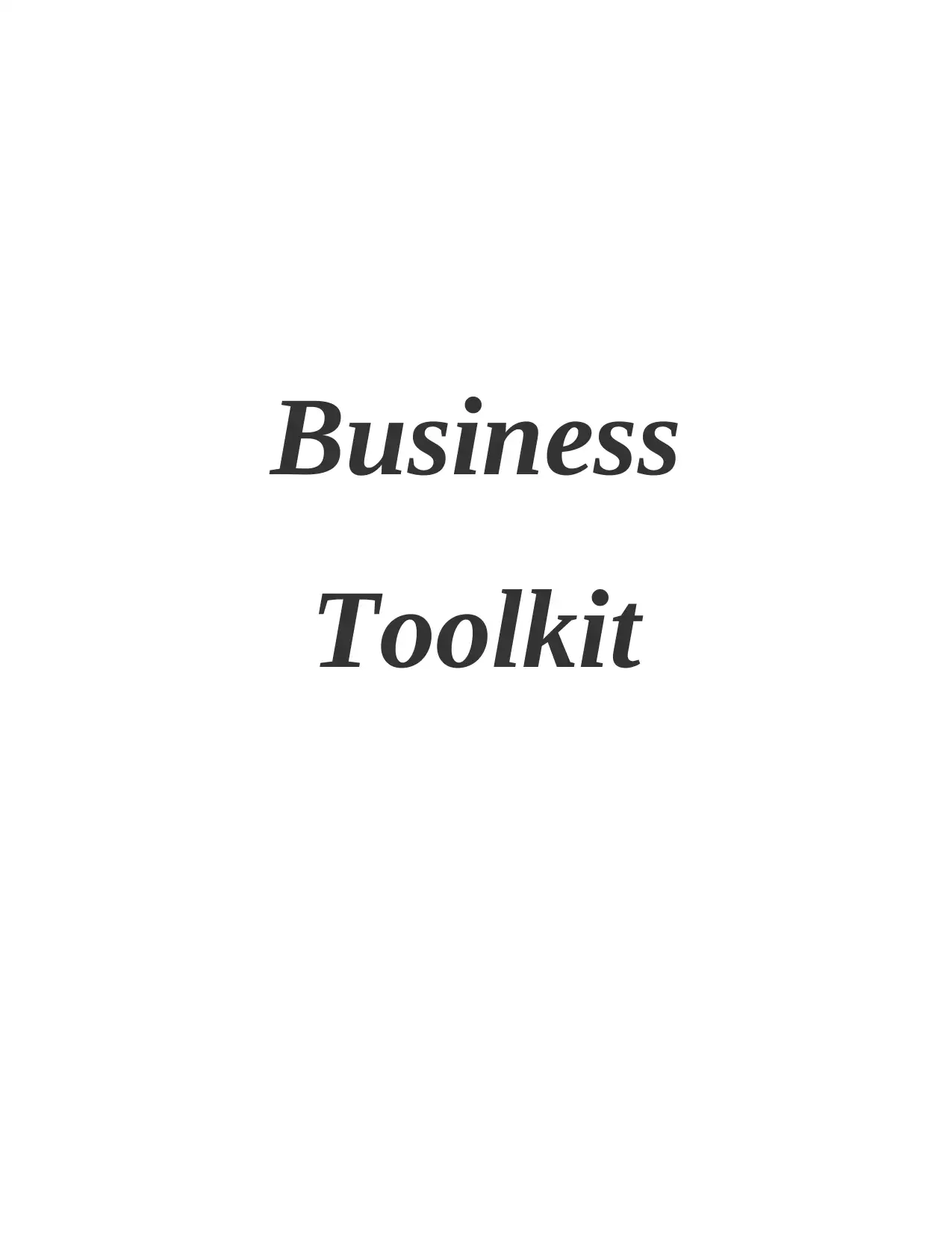
Business
Toolkit
Toolkit
Paraphrase This Document
Need a fresh take? Get an instant paraphrase of this document with our AI Paraphraser
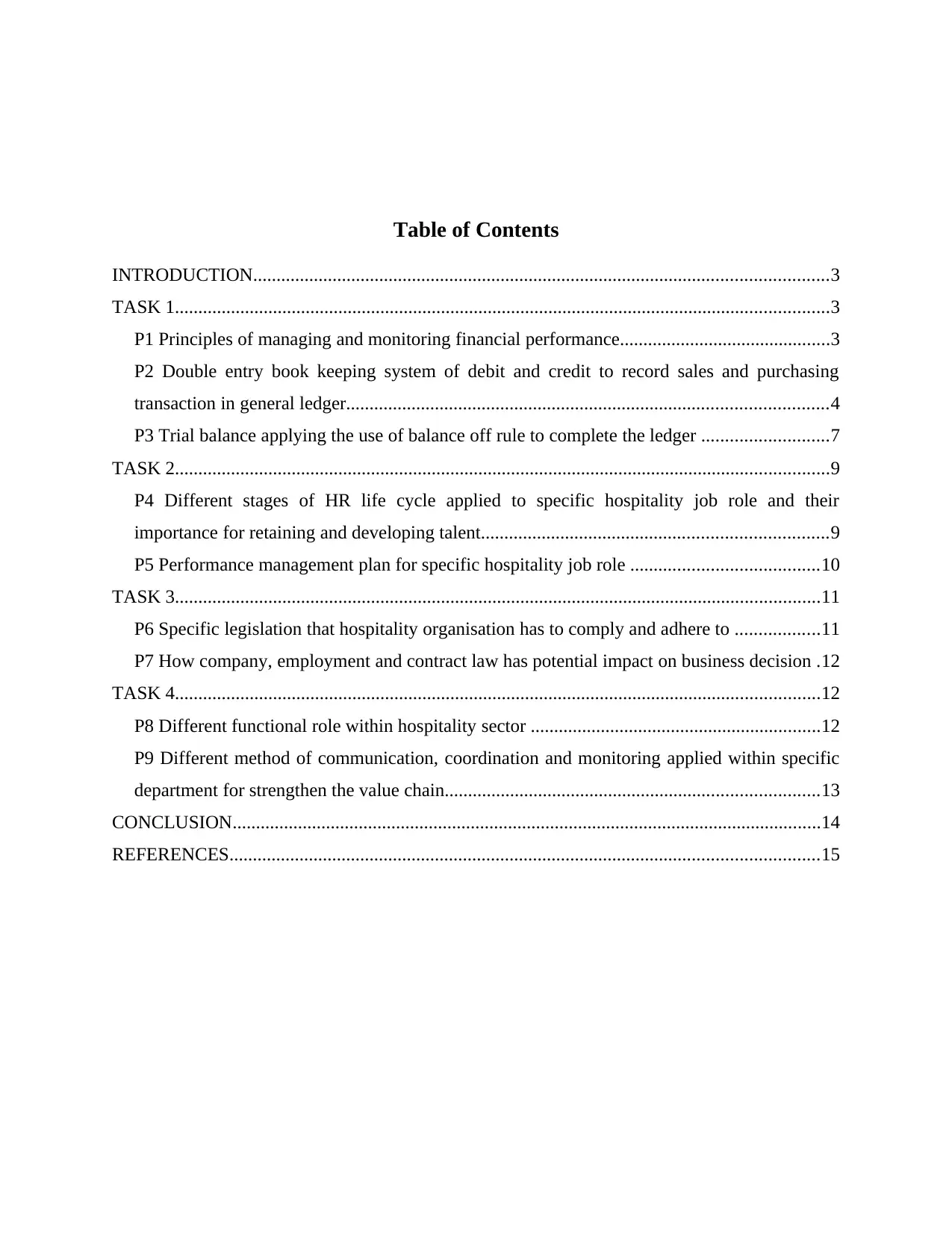
Table of Contents
INTRODUCTION...........................................................................................................................3
TASK 1............................................................................................................................................3
P1 Principles of managing and monitoring financial performance.............................................3
P2 Double entry book keeping system of debit and credit to record sales and purchasing
transaction in general ledger.......................................................................................................4
P3 Trial balance applying the use of balance off rule to complete the ledger ...........................7
TASK 2............................................................................................................................................9
P4 Different stages of HR life cycle applied to specific hospitality job role and their
importance for retaining and developing talent..........................................................................9
P5 Performance management plan for specific hospitality job role ........................................10
TASK 3..........................................................................................................................................11
P6 Specific legislation that hospitality organisation has to comply and adhere to ..................11
P7 How company, employment and contract law has potential impact on business decision .12
TASK 4..........................................................................................................................................12
P8 Different functional role within hospitality sector ..............................................................12
P9 Different method of communication, coordination and monitoring applied within specific
department for strengthen the value chain................................................................................13
CONCLUSION..............................................................................................................................14
REFERENCES..............................................................................................................................15
INTRODUCTION...........................................................................................................................3
TASK 1............................................................................................................................................3
P1 Principles of managing and monitoring financial performance.............................................3
P2 Double entry book keeping system of debit and credit to record sales and purchasing
transaction in general ledger.......................................................................................................4
P3 Trial balance applying the use of balance off rule to complete the ledger ...........................7
TASK 2............................................................................................................................................9
P4 Different stages of HR life cycle applied to specific hospitality job role and their
importance for retaining and developing talent..........................................................................9
P5 Performance management plan for specific hospitality job role ........................................10
TASK 3..........................................................................................................................................11
P6 Specific legislation that hospitality organisation has to comply and adhere to ..................11
P7 How company, employment and contract law has potential impact on business decision .12
TASK 4..........................................................................................................................................12
P8 Different functional role within hospitality sector ..............................................................12
P9 Different method of communication, coordination and monitoring applied within specific
department for strengthen the value chain................................................................................13
CONCLUSION..............................................................................................................................14
REFERENCES..............................................................................................................................15
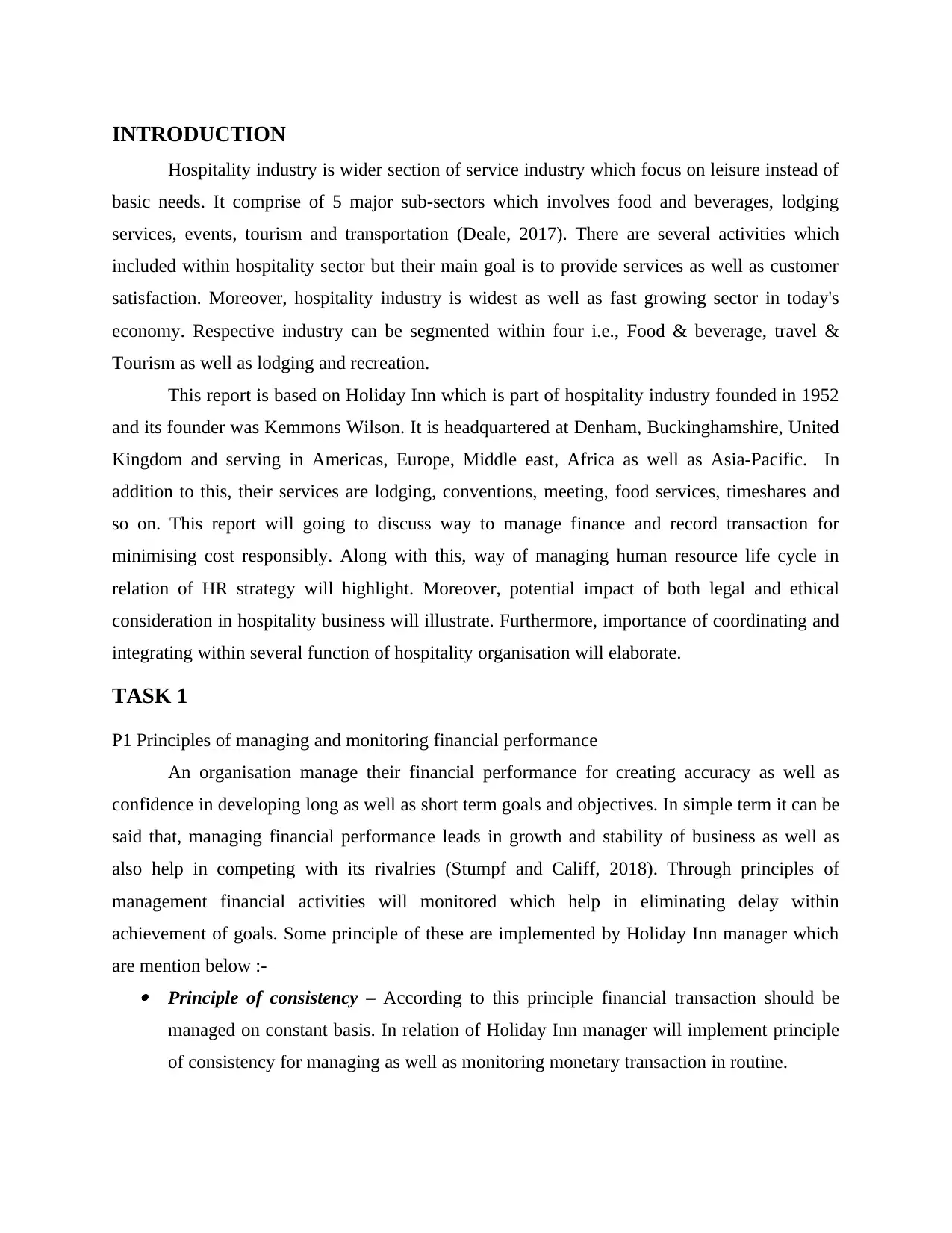
INTRODUCTION
Hospitality industry is wider section of service industry which focus on leisure instead of
basic needs. It comprise of 5 major sub-sectors which involves food and beverages, lodging
services, events, tourism and transportation (Deale, 2017). There are several activities which
included within hospitality sector but their main goal is to provide services as well as customer
satisfaction. Moreover, hospitality industry is widest as well as fast growing sector in today's
economy. Respective industry can be segmented within four i.e., Food & beverage, travel &
Tourism as well as lodging and recreation.
This report is based on Holiday Inn which is part of hospitality industry founded in 1952
and its founder was Kemmons Wilson. It is headquartered at Denham, Buckinghamshire, United
Kingdom and serving in Americas, Europe, Middle east, Africa as well as Asia-Pacific. In
addition to this, their services are lodging, conventions, meeting, food services, timeshares and
so on. This report will going to discuss way to manage finance and record transaction for
minimising cost responsibly. Along with this, way of managing human resource life cycle in
relation of HR strategy will highlight. Moreover, potential impact of both legal and ethical
consideration in hospitality business will illustrate. Furthermore, importance of coordinating and
integrating within several function of hospitality organisation will elaborate.
TASK 1
P1 Principles of managing and monitoring financial performance
An organisation manage their financial performance for creating accuracy as well as
confidence in developing long as well as short term goals and objectives. In simple term it can be
said that, managing financial performance leads in growth and stability of business as well as
also help in competing with its rivalries (Stumpf and Califf, 2018). Through principles of
management financial activities will monitored which help in eliminating delay within
achievement of goals. Some principle of these are implemented by Holiday Inn manager which
are mention below :- Principle of consistency – According to this principle financial transaction should be
managed on constant basis. In relation of Holiday Inn manager will implement principle
of consistency for managing as well as monitoring monetary transaction in routine.
Hospitality industry is wider section of service industry which focus on leisure instead of
basic needs. It comprise of 5 major sub-sectors which involves food and beverages, lodging
services, events, tourism and transportation (Deale, 2017). There are several activities which
included within hospitality sector but their main goal is to provide services as well as customer
satisfaction. Moreover, hospitality industry is widest as well as fast growing sector in today's
economy. Respective industry can be segmented within four i.e., Food & beverage, travel &
Tourism as well as lodging and recreation.
This report is based on Holiday Inn which is part of hospitality industry founded in 1952
and its founder was Kemmons Wilson. It is headquartered at Denham, Buckinghamshire, United
Kingdom and serving in Americas, Europe, Middle east, Africa as well as Asia-Pacific. In
addition to this, their services are lodging, conventions, meeting, food services, timeshares and
so on. This report will going to discuss way to manage finance and record transaction for
minimising cost responsibly. Along with this, way of managing human resource life cycle in
relation of HR strategy will highlight. Moreover, potential impact of both legal and ethical
consideration in hospitality business will illustrate. Furthermore, importance of coordinating and
integrating within several function of hospitality organisation will elaborate.
TASK 1
P1 Principles of managing and monitoring financial performance
An organisation manage their financial performance for creating accuracy as well as
confidence in developing long as well as short term goals and objectives. In simple term it can be
said that, managing financial performance leads in growth and stability of business as well as
also help in competing with its rivalries (Stumpf and Califf, 2018). Through principles of
management financial activities will monitored which help in eliminating delay within
achievement of goals. Some principle of these are implemented by Holiday Inn manager which
are mention below :- Principle of consistency – According to this principle financial transaction should be
managed on constant basis. In relation of Holiday Inn manager will implement principle
of consistency for managing as well as monitoring monetary transaction in routine.
⊘ This is a preview!⊘
Do you want full access?
Subscribe today to unlock all pages.

Trusted by 1+ million students worldwide
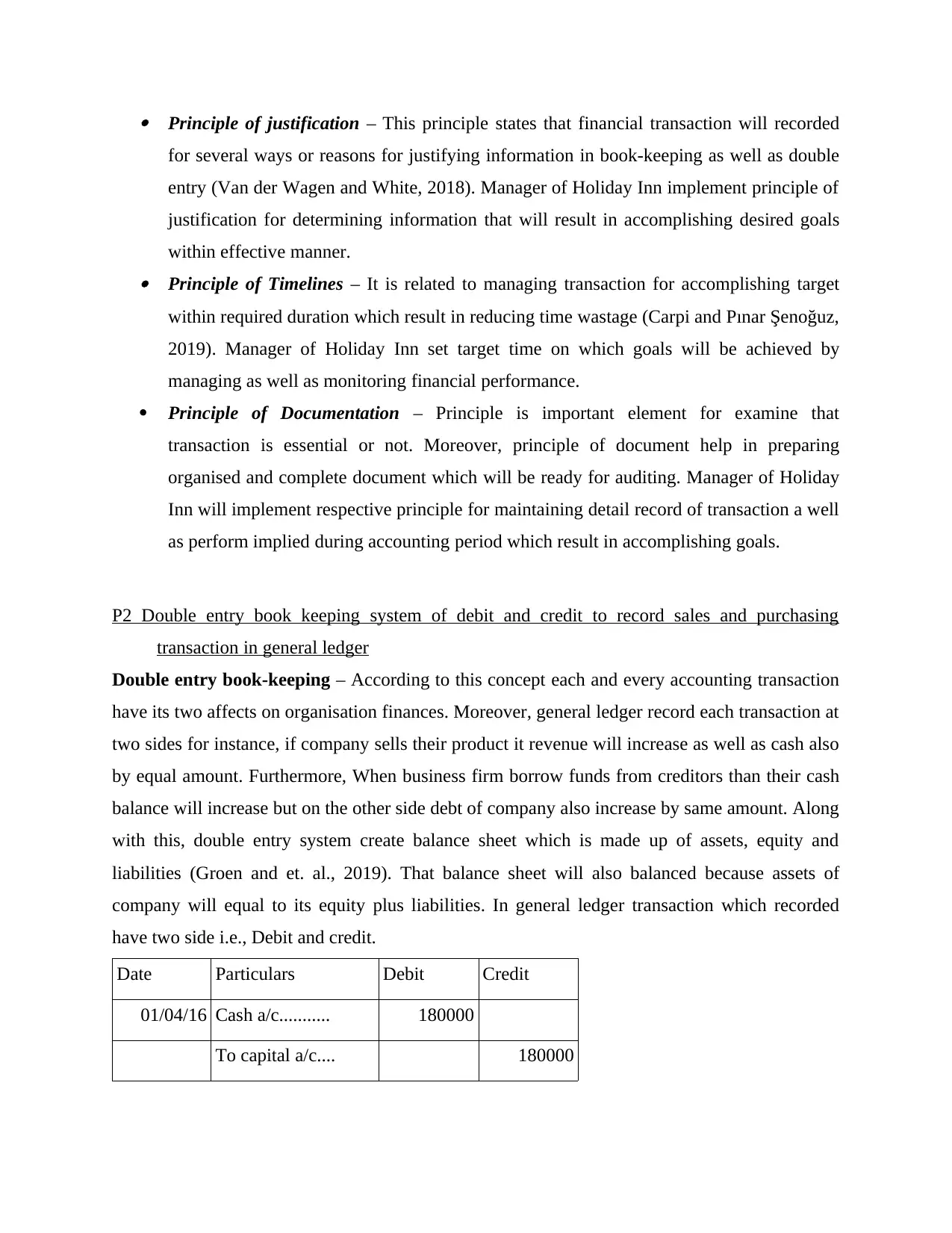
Principle of justification – This principle states that financial transaction will recorded
for several ways or reasons for justifying information in book-keeping as well as double
entry (Van der Wagen and White, 2018). Manager of Holiday Inn implement principle of
justification for determining information that will result in accomplishing desired goals
within effective manner. Principle of Timelines – It is related to managing transaction for accomplishing target
within required duration which result in reducing time wastage (Carpi and Pınar Şenoğuz,
2019). Manager of Holiday Inn set target time on which goals will be achieved by
managing as well as monitoring financial performance.
Principle of Documentation – Principle is important element for examine that
transaction is essential or not. Moreover, principle of document help in preparing
organised and complete document which will be ready for auditing. Manager of Holiday
Inn will implement respective principle for maintaining detail record of transaction a well
as perform implied during accounting period which result in accomplishing goals.
P2 Double entry book keeping system of debit and credit to record sales and purchasing
transaction in general ledger
Double entry book-keeping – According to this concept each and every accounting transaction
have its two affects on organisation finances. Moreover, general ledger record each transaction at
two sides for instance, if company sells their product it revenue will increase as well as cash also
by equal amount. Furthermore, When business firm borrow funds from creditors than their cash
balance will increase but on the other side debt of company also increase by same amount. Along
with this, double entry system create balance sheet which is made up of assets, equity and
liabilities (Groen and et. al., 2019). That balance sheet will also balanced because assets of
company will equal to its equity plus liabilities. In general ledger transaction which recorded
have two side i.e., Debit and credit.
Date Particulars Debit Credit
01/04/16 Cash a/c........... 180000
To capital a/c.... 180000
for several ways or reasons for justifying information in book-keeping as well as double
entry (Van der Wagen and White, 2018). Manager of Holiday Inn implement principle of
justification for determining information that will result in accomplishing desired goals
within effective manner. Principle of Timelines – It is related to managing transaction for accomplishing target
within required duration which result in reducing time wastage (Carpi and Pınar Şenoğuz,
2019). Manager of Holiday Inn set target time on which goals will be achieved by
managing as well as monitoring financial performance.
Principle of Documentation – Principle is important element for examine that
transaction is essential or not. Moreover, principle of document help in preparing
organised and complete document which will be ready for auditing. Manager of Holiday
Inn will implement respective principle for maintaining detail record of transaction a well
as perform implied during accounting period which result in accomplishing goals.
P2 Double entry book keeping system of debit and credit to record sales and purchasing
transaction in general ledger
Double entry book-keeping – According to this concept each and every accounting transaction
have its two affects on organisation finances. Moreover, general ledger record each transaction at
two sides for instance, if company sells their product it revenue will increase as well as cash also
by equal amount. Furthermore, When business firm borrow funds from creditors than their cash
balance will increase but on the other side debt of company also increase by same amount. Along
with this, double entry system create balance sheet which is made up of assets, equity and
liabilities (Groen and et. al., 2019). That balance sheet will also balanced because assets of
company will equal to its equity plus liabilities. In general ledger transaction which recorded
have two side i.e., Debit and credit.
Date Particulars Debit Credit
01/04/16 Cash a/c........... 180000
To capital a/c.... 180000
Paraphrase This Document
Need a fresh take? Get an instant paraphrase of this document with our AI Paraphraser
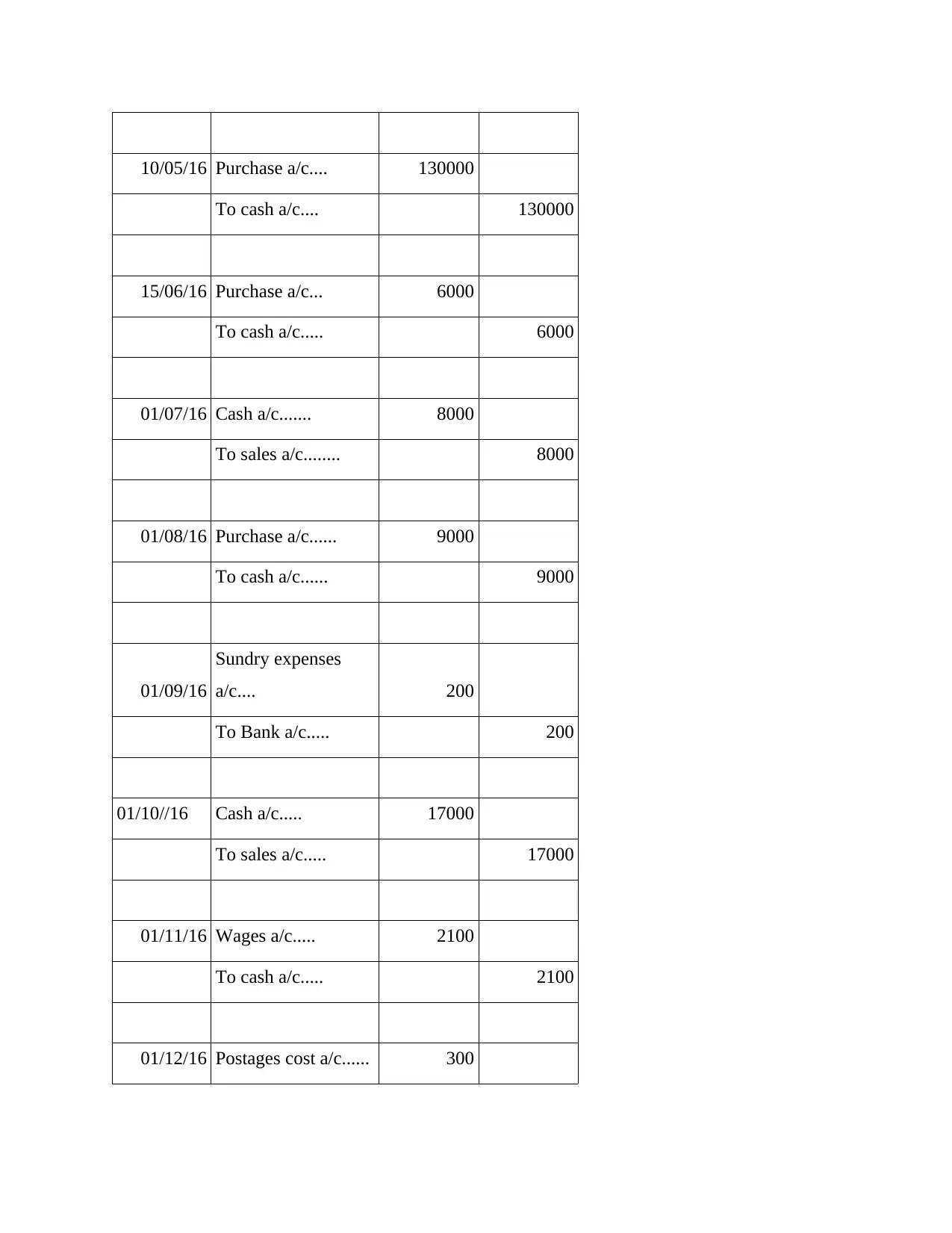
10/05/16 Purchase a/c.... 130000
To cash a/c.... 130000
15/06/16 Purchase a/c... 6000
To cash a/c..... 6000
01/07/16 Cash a/c....... 8000
To sales a/c........ 8000
01/08/16 Purchase a/c...... 9000
To cash a/c...... 9000
01/09/16
Sundry expenses
a/c.... 200
To Bank a/c..... 200
01/10//16 Cash a/c..... 17000
To sales a/c..... 17000
01/11/16 Wages a/c..... 2100
To cash a/c..... 2100
01/12/16 Postages cost a/c...... 300
To cash a/c.... 130000
15/06/16 Purchase a/c... 6000
To cash a/c..... 6000
01/07/16 Cash a/c....... 8000
To sales a/c........ 8000
01/08/16 Purchase a/c...... 9000
To cash a/c...... 9000
01/09/16
Sundry expenses
a/c.... 200
To Bank a/c..... 200
01/10//16 Cash a/c..... 17000
To sales a/c..... 17000
01/11/16 Wages a/c..... 2100
To cash a/c..... 2100
01/12/16 Postages cost a/c...... 300
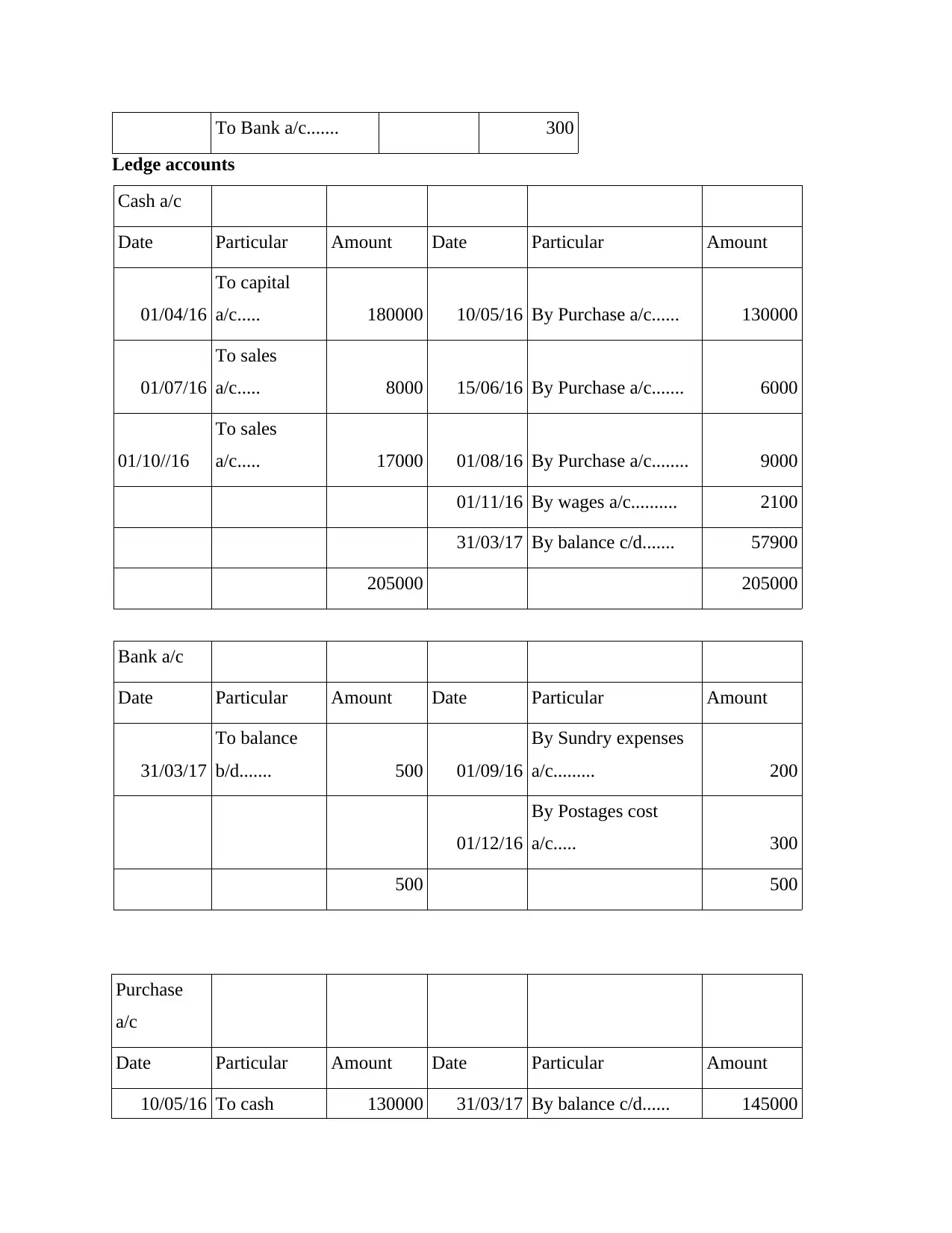
To Bank a/c....... 300
Ledge accounts
Cash a/c
Date Particular Amount Date Particular Amount
01/04/16
To capital
a/c..... 180000 10/05/16 By Purchase a/c...... 130000
01/07/16
To sales
a/c..... 8000 15/06/16 By Purchase a/c....... 6000
01/10//16
To sales
a/c..... 17000 01/08/16 By Purchase a/c........ 9000
01/11/16 By wages a/c.......... 2100
31/03/17 By balance c/d....... 57900
205000 205000
Bank a/c
Date Particular Amount Date Particular Amount
31/03/17
To balance
b/d....... 500 01/09/16
By Sundry expenses
a/c......... 200
01/12/16
By Postages cost
a/c..... 300
500 500
Purchase
a/c
Date Particular Amount Date Particular Amount
10/05/16 To cash 130000 31/03/17 By balance c/d...... 145000
Ledge accounts
Cash a/c
Date Particular Amount Date Particular Amount
01/04/16
To capital
a/c..... 180000 10/05/16 By Purchase a/c...... 130000
01/07/16
To sales
a/c..... 8000 15/06/16 By Purchase a/c....... 6000
01/10//16
To sales
a/c..... 17000 01/08/16 By Purchase a/c........ 9000
01/11/16 By wages a/c.......... 2100
31/03/17 By balance c/d....... 57900
205000 205000
Bank a/c
Date Particular Amount Date Particular Amount
31/03/17
To balance
b/d....... 500 01/09/16
By Sundry expenses
a/c......... 200
01/12/16
By Postages cost
a/c..... 300
500 500
Purchase
a/c
Date Particular Amount Date Particular Amount
10/05/16 To cash 130000 31/03/17 By balance c/d...... 145000
⊘ This is a preview!⊘
Do you want full access?
Subscribe today to unlock all pages.

Trusted by 1+ million students worldwide
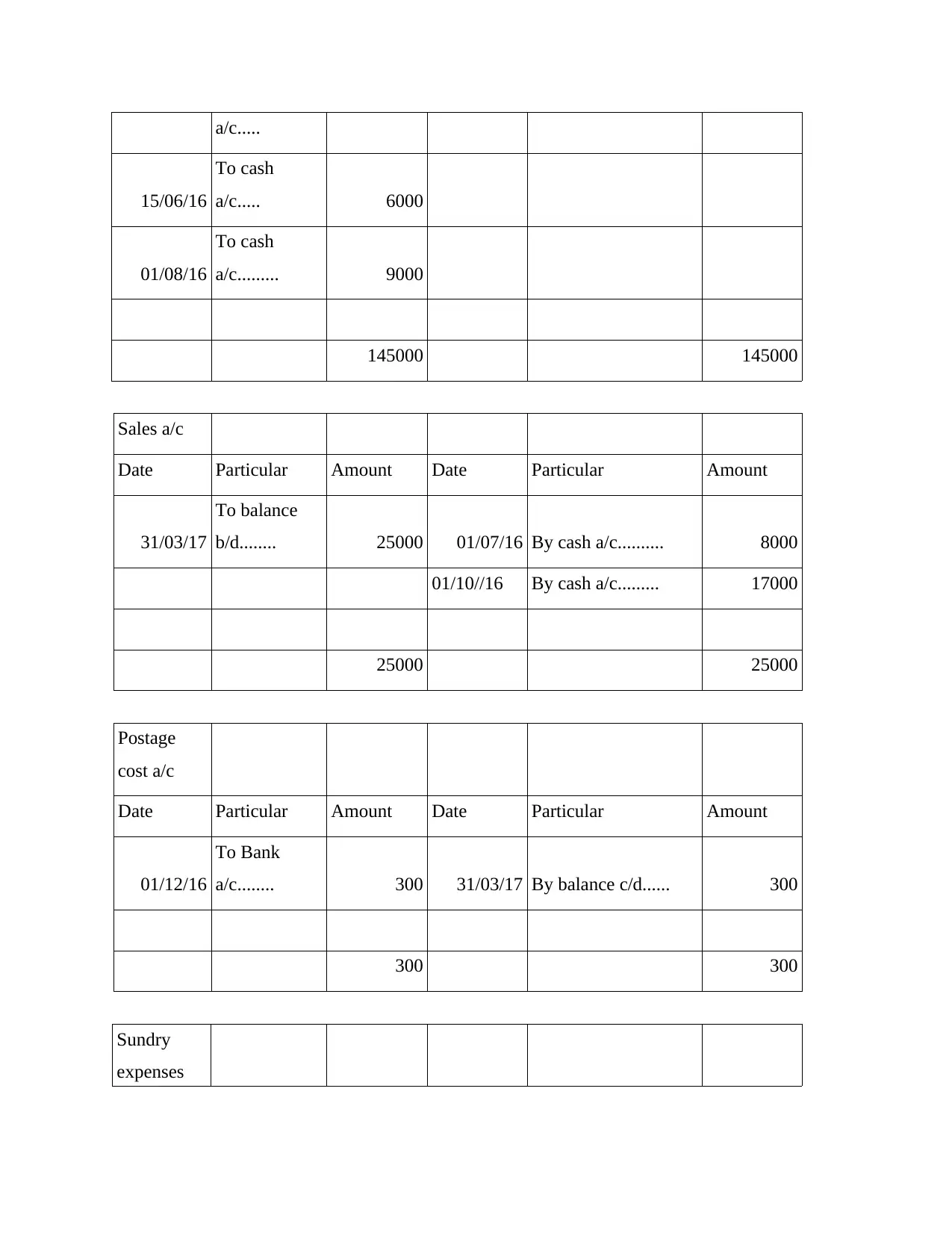
a/c.....
15/06/16
To cash
a/c..... 6000
01/08/16
To cash
a/c......... 9000
145000 145000
Sales a/c
Date Particular Amount Date Particular Amount
31/03/17
To balance
b/d........ 25000 01/07/16 By cash a/c.......... 8000
01/10//16 By cash a/c......... 17000
25000 25000
Postage
cost a/c
Date Particular Amount Date Particular Amount
01/12/16
To Bank
a/c........ 300 31/03/17 By balance c/d...... 300
300 300
Sundry
expenses
15/06/16
To cash
a/c..... 6000
01/08/16
To cash
a/c......... 9000
145000 145000
Sales a/c
Date Particular Amount Date Particular Amount
31/03/17
To balance
b/d........ 25000 01/07/16 By cash a/c.......... 8000
01/10//16 By cash a/c......... 17000
25000 25000
Postage
cost a/c
Date Particular Amount Date Particular Amount
01/12/16
To Bank
a/c........ 300 31/03/17 By balance c/d...... 300
300 300
Sundry
expenses
Paraphrase This Document
Need a fresh take? Get an instant paraphrase of this document with our AI Paraphraser
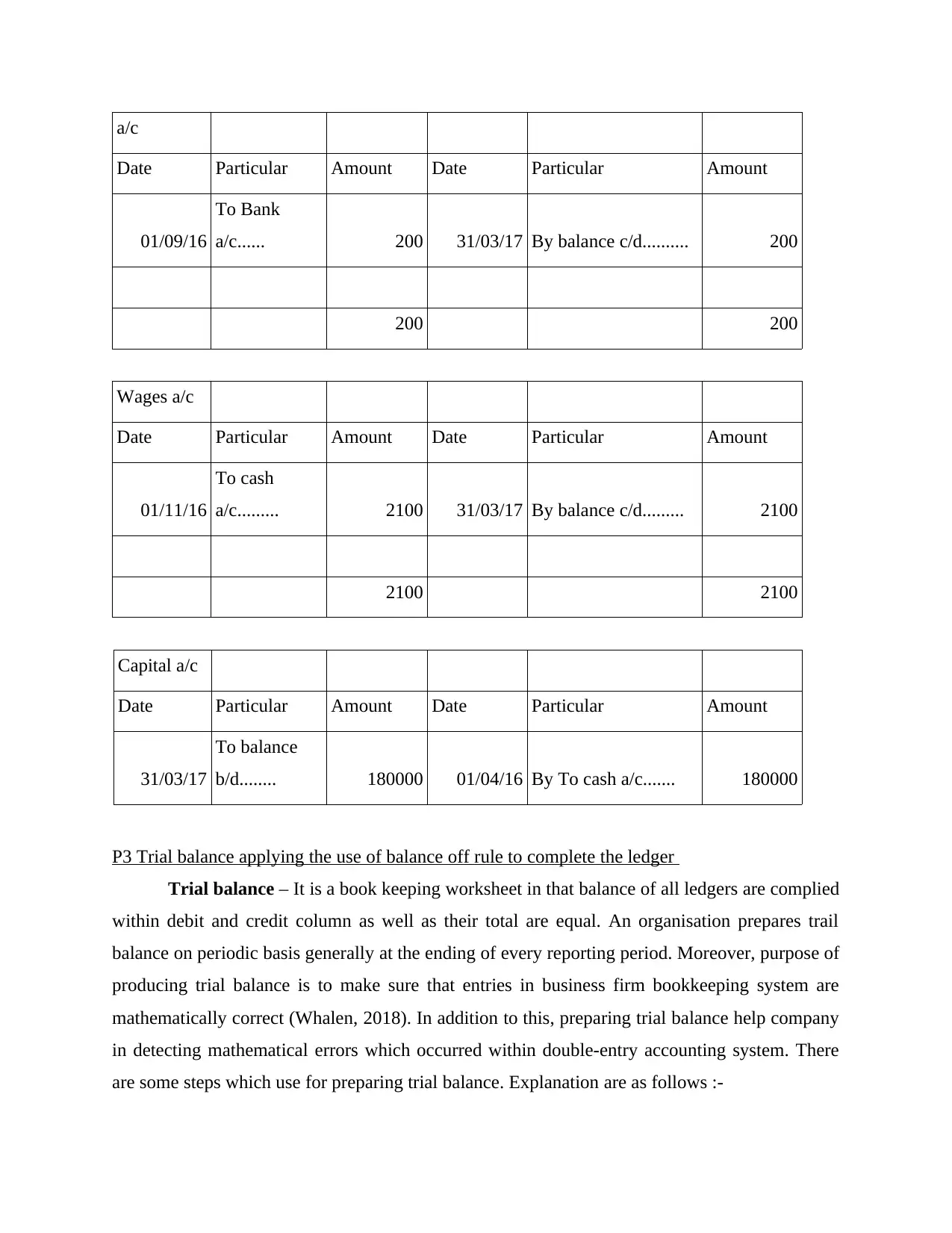
a/c
Date Particular Amount Date Particular Amount
01/09/16
To Bank
a/c...... 200 31/03/17 By balance c/d.......... 200
200 200
Wages a/c
Date Particular Amount Date Particular Amount
01/11/16
To cash
a/c......... 2100 31/03/17 By balance c/d......... 2100
2100 2100
Capital a/c
Date Particular Amount Date Particular Amount
31/03/17
To balance
b/d........ 180000 01/04/16 By To cash a/c....... 180000
P3 Trial balance applying the use of balance off rule to complete the ledger
Trial balance – It is a book keeping worksheet in that balance of all ledgers are complied
within debit and credit column as well as their total are equal. An organisation prepares trail
balance on periodic basis generally at the ending of every reporting period. Moreover, purpose of
producing trial balance is to make sure that entries in business firm bookkeeping system are
mathematically correct (Whalen, 2018). In addition to this, preparing trial balance help company
in detecting mathematical errors which occurred within double-entry accounting system. There
are some steps which use for preparing trial balance. Explanation are as follows :-
Date Particular Amount Date Particular Amount
01/09/16
To Bank
a/c...... 200 31/03/17 By balance c/d.......... 200
200 200
Wages a/c
Date Particular Amount Date Particular Amount
01/11/16
To cash
a/c......... 2100 31/03/17 By balance c/d......... 2100
2100 2100
Capital a/c
Date Particular Amount Date Particular Amount
31/03/17
To balance
b/d........ 180000 01/04/16 By To cash a/c....... 180000
P3 Trial balance applying the use of balance off rule to complete the ledger
Trial balance – It is a book keeping worksheet in that balance of all ledgers are complied
within debit and credit column as well as their total are equal. An organisation prepares trail
balance on periodic basis generally at the ending of every reporting period. Moreover, purpose of
producing trial balance is to make sure that entries in business firm bookkeeping system are
mathematically correct (Whalen, 2018). In addition to this, preparing trial balance help company
in detecting mathematical errors which occurred within double-entry accounting system. There
are some steps which use for preparing trial balance. Explanation are as follows :-
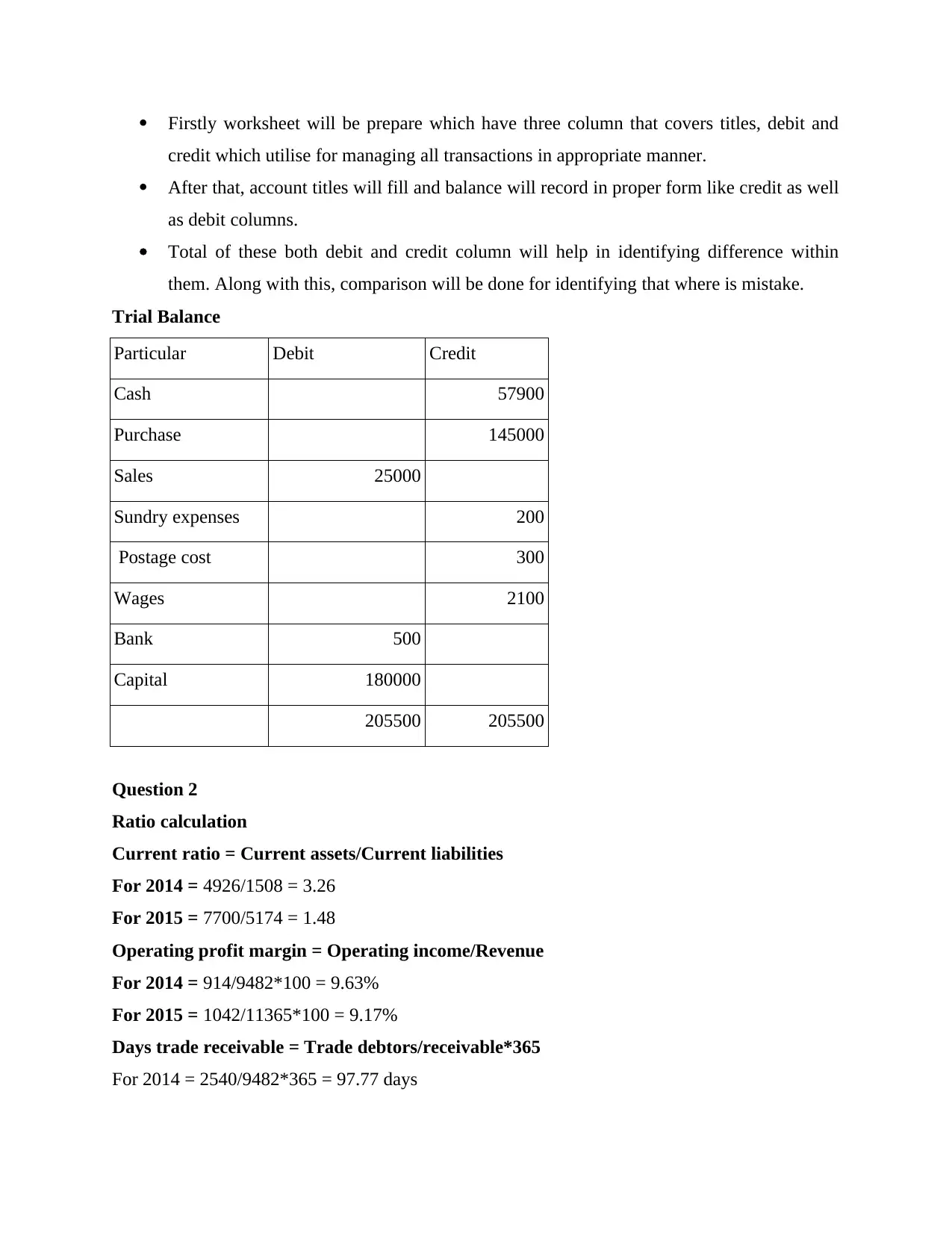
Firstly worksheet will be prepare which have three column that covers titles, debit and
credit which utilise for managing all transactions in appropriate manner.
After that, account titles will fill and balance will record in proper form like credit as well
as debit columns.
Total of these both debit and credit column will help in identifying difference within
them. Along with this, comparison will be done for identifying that where is mistake.
Trial Balance
Particular Debit Credit
Cash 57900
Purchase 145000
Sales 25000
Sundry expenses 200
Postage cost 300
Wages 2100
Bank 500
Capital 180000
205500 205500
Question 2
Ratio calculation
Current ratio = Current assets/Current liabilities
For 2014 = 4926/1508 = 3.26
For 2015 = 7700/5174 = 1.48
Operating profit margin = Operating income/Revenue
For 2014 = 914/9482*100 = 9.63%
For 2015 = 1042/11365*100 = 9.17%
Days trade receivable = Trade debtors/receivable*365
For 2014 = 2540/9482*365 = 97.77 days
credit which utilise for managing all transactions in appropriate manner.
After that, account titles will fill and balance will record in proper form like credit as well
as debit columns.
Total of these both debit and credit column will help in identifying difference within
them. Along with this, comparison will be done for identifying that where is mistake.
Trial Balance
Particular Debit Credit
Cash 57900
Purchase 145000
Sales 25000
Sundry expenses 200
Postage cost 300
Wages 2100
Bank 500
Capital 180000
205500 205500
Question 2
Ratio calculation
Current ratio = Current assets/Current liabilities
For 2014 = 4926/1508 = 3.26
For 2015 = 7700/5174 = 1.48
Operating profit margin = Operating income/Revenue
For 2014 = 914/9482*100 = 9.63%
For 2015 = 1042/11365*100 = 9.17%
Days trade receivable = Trade debtors/receivable*365
For 2014 = 2540/9482*365 = 97.77 days
⊘ This is a preview!⊘
Do you want full access?
Subscribe today to unlock all pages.

Trusted by 1+ million students worldwide
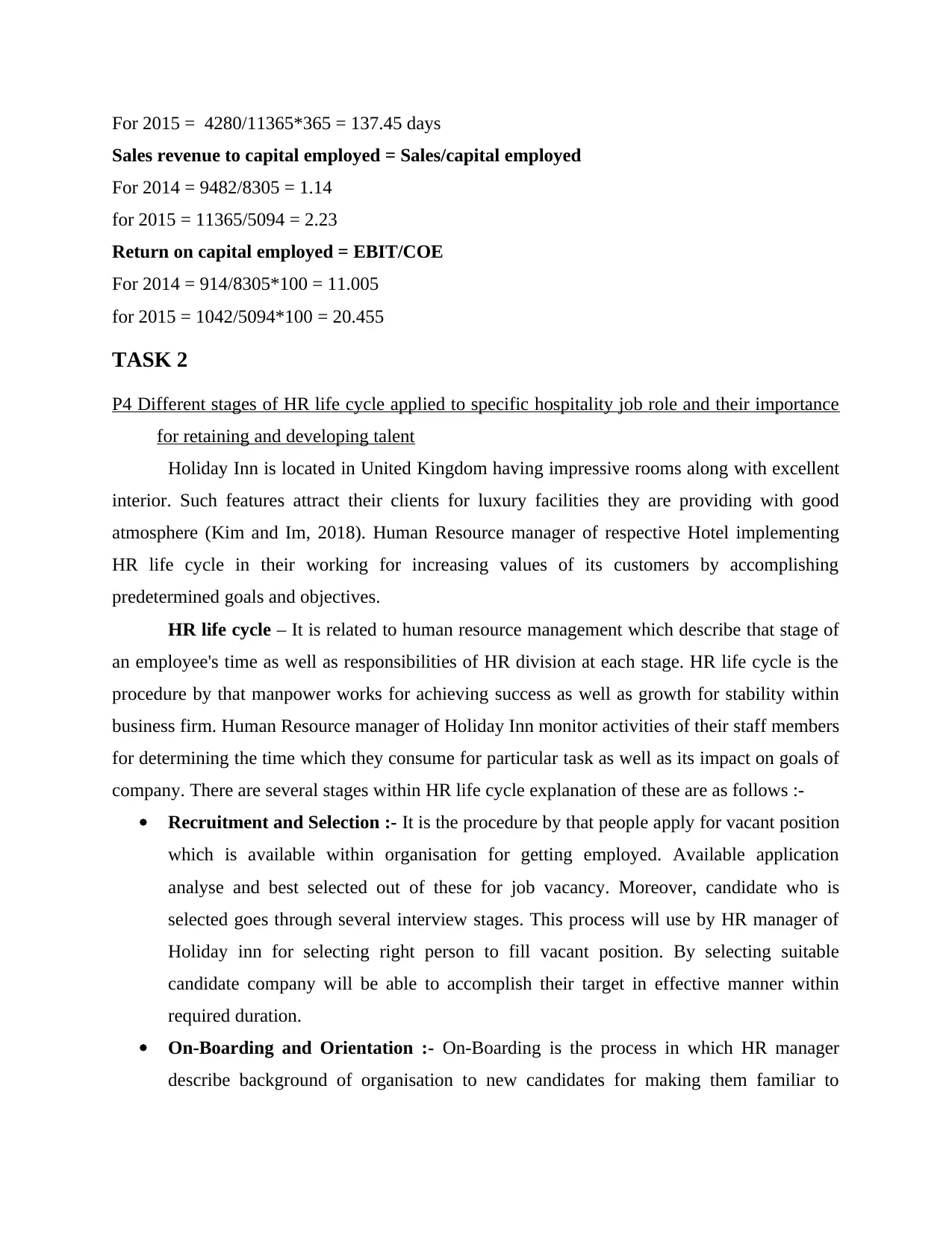
For 2015 = 4280/11365*365 = 137.45 days
Sales revenue to capital employed = Sales/capital employed
For 2014 = 9482/8305 = 1.14
for 2015 = 11365/5094 = 2.23
Return on capital employed = EBIT/COE
For 2014 = 914/8305*100 = 11.005
for 2015 = 1042/5094*100 = 20.455
TASK 2
P4 Different stages of HR life cycle applied to specific hospitality job role and their importance
for retaining and developing talent
Holiday Inn is located in United Kingdom having impressive rooms along with excellent
interior. Such features attract their clients for luxury facilities they are providing with good
atmosphere (Kim and Im, 2018). Human Resource manager of respective Hotel implementing
HR life cycle in their working for increasing values of its customers by accomplishing
predetermined goals and objectives.
HR life cycle – It is related to human resource management which describe that stage of
an employee's time as well as responsibilities of HR division at each stage. HR life cycle is the
procedure by that manpower works for achieving success as well as growth for stability within
business firm. Human Resource manager of Holiday Inn monitor activities of their staff members
for determining the time which they consume for particular task as well as its impact on goals of
company. There are several stages within HR life cycle explanation of these are as follows :-
Recruitment and Selection :- It is the procedure by that people apply for vacant position
which is available within organisation for getting employed. Available application
analyse and best selected out of these for job vacancy. Moreover, candidate who is
selected goes through several interview stages. This process will use by HR manager of
Holiday inn for selecting right person to fill vacant position. By selecting suitable
candidate company will be able to accomplish their target in effective manner within
required duration.
On-Boarding and Orientation :- On-Boarding is the process in which HR manager
describe background of organisation to new candidates for making them familiar to
Sales revenue to capital employed = Sales/capital employed
For 2014 = 9482/8305 = 1.14
for 2015 = 11365/5094 = 2.23
Return on capital employed = EBIT/COE
For 2014 = 914/8305*100 = 11.005
for 2015 = 1042/5094*100 = 20.455
TASK 2
P4 Different stages of HR life cycle applied to specific hospitality job role and their importance
for retaining and developing talent
Holiday Inn is located in United Kingdom having impressive rooms along with excellent
interior. Such features attract their clients for luxury facilities they are providing with good
atmosphere (Kim and Im, 2018). Human Resource manager of respective Hotel implementing
HR life cycle in their working for increasing values of its customers by accomplishing
predetermined goals and objectives.
HR life cycle – It is related to human resource management which describe that stage of
an employee's time as well as responsibilities of HR division at each stage. HR life cycle is the
procedure by that manpower works for achieving success as well as growth for stability within
business firm. Human Resource manager of Holiday Inn monitor activities of their staff members
for determining the time which they consume for particular task as well as its impact on goals of
company. There are several stages within HR life cycle explanation of these are as follows :-
Recruitment and Selection :- It is the procedure by that people apply for vacant position
which is available within organisation for getting employed. Available application
analyse and best selected out of these for job vacancy. Moreover, candidate who is
selected goes through several interview stages. This process will use by HR manager of
Holiday inn for selecting right person to fill vacant position. By selecting suitable
candidate company will be able to accomplish their target in effective manner within
required duration.
On-Boarding and Orientation :- On-Boarding is the process in which HR manager
describe background of organisation to new candidates for making them familiar to
Paraphrase This Document
Need a fresh take? Get an instant paraphrase of this document with our AI Paraphraser
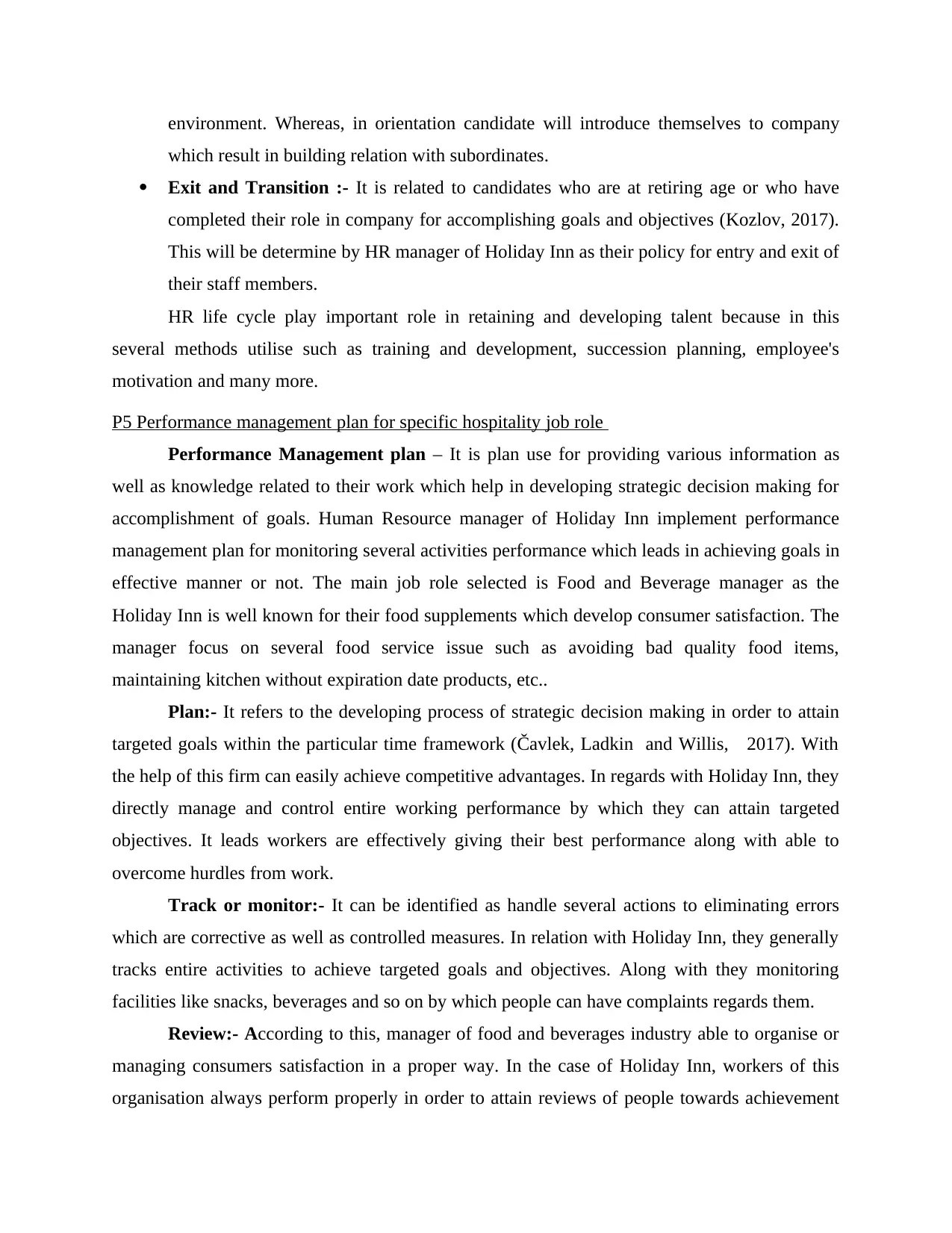
environment. Whereas, in orientation candidate will introduce themselves to company
which result in building relation with subordinates.
Exit and Transition :- It is related to candidates who are at retiring age or who have
completed their role in company for accomplishing goals and objectives (Kozlov, 2017).
This will be determine by HR manager of Holiday Inn as their policy for entry and exit of
their staff members.
HR life cycle play important role in retaining and developing talent because in this
several methods utilise such as training and development, succession planning, employee's
motivation and many more.
P5 Performance management plan for specific hospitality job role
Performance Management plan – It is plan use for providing various information as
well as knowledge related to their work which help in developing strategic decision making for
accomplishment of goals. Human Resource manager of Holiday Inn implement performance
management plan for monitoring several activities performance which leads in achieving goals in
effective manner or not. The main job role selected is Food and Beverage manager as the
Holiday Inn is well known for their food supplements which develop consumer satisfaction. The
manager focus on several food service issue such as avoiding bad quality food items,
maintaining kitchen without expiration date products, etc..
Plan:- It refers to the developing process of strategic decision making in order to attain
targeted goals within the particular time framework (Čavlek, Ladkin and Willis, 2017). With
the help of this firm can easily achieve competitive advantages. In regards with Holiday Inn, they
directly manage and control entire working performance by which they can attain targeted
objectives. It leads workers are effectively giving their best performance along with able to
overcome hurdles from work.
Track or monitor:- It can be identified as handle several actions to eliminating errors
which are corrective as well as controlled measures. In relation with Holiday Inn, they generally
tracks entire activities to achieve targeted goals and objectives. Along with they monitoring
facilities like snacks, beverages and so on by which people can have complaints regards them.
Review:- According to this, manager of food and beverages industry able to organise or
managing consumers satisfaction in a proper way. In the case of Holiday Inn, workers of this
organisation always perform properly in order to attain reviews of people towards achievement
which result in building relation with subordinates.
Exit and Transition :- It is related to candidates who are at retiring age or who have
completed their role in company for accomplishing goals and objectives (Kozlov, 2017).
This will be determine by HR manager of Holiday Inn as their policy for entry and exit of
their staff members.
HR life cycle play important role in retaining and developing talent because in this
several methods utilise such as training and development, succession planning, employee's
motivation and many more.
P5 Performance management plan for specific hospitality job role
Performance Management plan – It is plan use for providing various information as
well as knowledge related to their work which help in developing strategic decision making for
accomplishment of goals. Human Resource manager of Holiday Inn implement performance
management plan for monitoring several activities performance which leads in achieving goals in
effective manner or not. The main job role selected is Food and Beverage manager as the
Holiday Inn is well known for their food supplements which develop consumer satisfaction. The
manager focus on several food service issue such as avoiding bad quality food items,
maintaining kitchen without expiration date products, etc..
Plan:- It refers to the developing process of strategic decision making in order to attain
targeted goals within the particular time framework (Čavlek, Ladkin and Willis, 2017). With
the help of this firm can easily achieve competitive advantages. In regards with Holiday Inn, they
directly manage and control entire working performance by which they can attain targeted
objectives. It leads workers are effectively giving their best performance along with able to
overcome hurdles from work.
Track or monitor:- It can be identified as handle several actions to eliminating errors
which are corrective as well as controlled measures. In relation with Holiday Inn, they generally
tracks entire activities to achieve targeted goals and objectives. Along with they monitoring
facilities like snacks, beverages and so on by which people can have complaints regards them.
Review:- According to this, manager of food and beverages industry able to organise or
managing consumers satisfaction in a proper way. In the case of Holiday Inn, workers of this
organisation always perform properly in order to attain reviews of people towards achievement
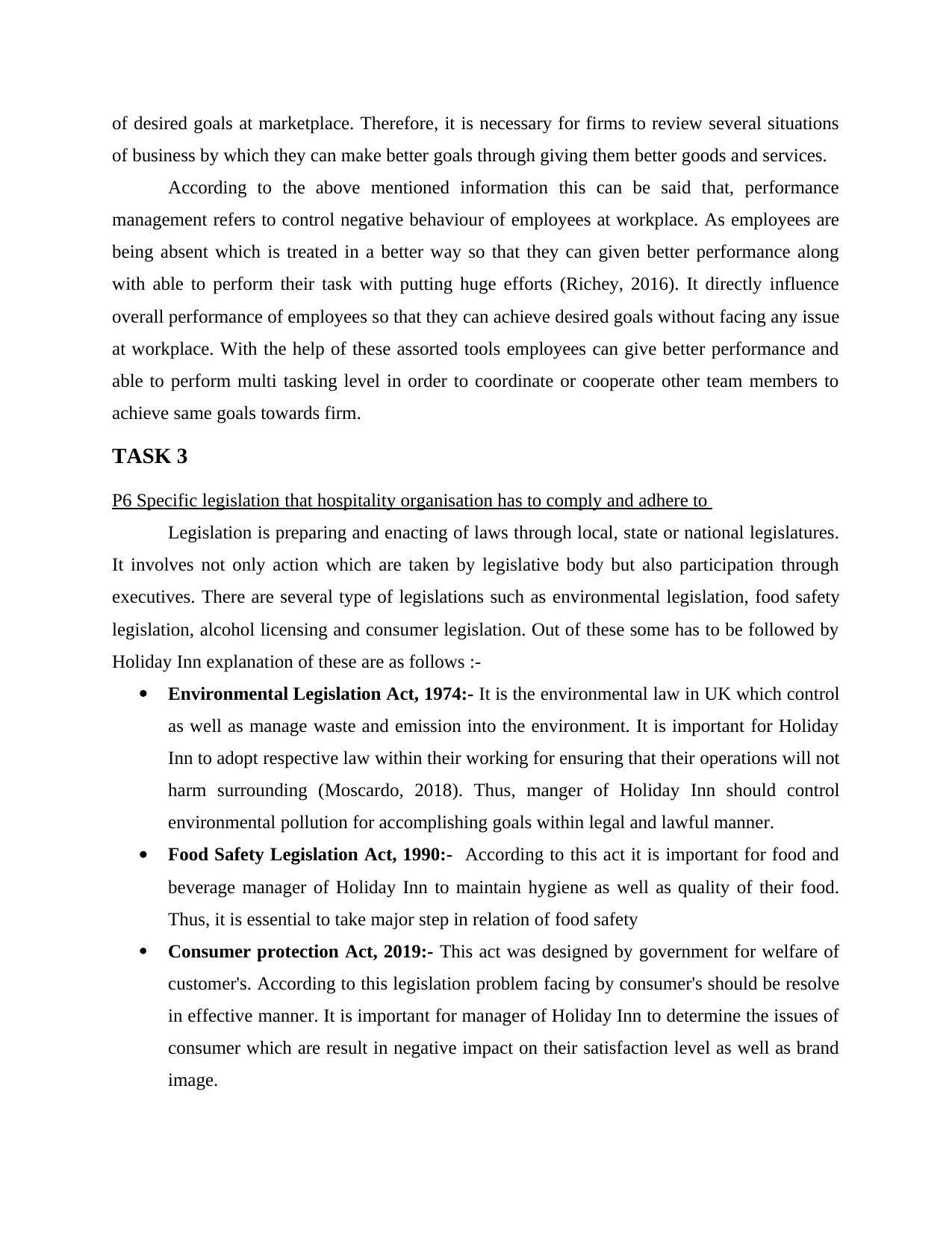
of desired goals at marketplace. Therefore, it is necessary for firms to review several situations
of business by which they can make better goals through giving them better goods and services.
According to the above mentioned information this can be said that, performance
management refers to control negative behaviour of employees at workplace. As employees are
being absent which is treated in a better way so that they can given better performance along
with able to perform their task with putting huge efforts (Richey, 2016). It directly influence
overall performance of employees so that they can achieve desired goals without facing any issue
at workplace. With the help of these assorted tools employees can give better performance and
able to perform multi tasking level in order to coordinate or cooperate other team members to
achieve same goals towards firm.
TASK 3
P6 Specific legislation that hospitality organisation has to comply and adhere to
Legislation is preparing and enacting of laws through local, state or national legislatures.
It involves not only action which are taken by legislative body but also participation through
executives. There are several type of legislations such as environmental legislation, food safety
legislation, alcohol licensing and consumer legislation. Out of these some has to be followed by
Holiday Inn explanation of these are as follows :-
Environmental Legislation Act, 1974:- It is the environmental law in UK which control
as well as manage waste and emission into the environment. It is important for Holiday
Inn to adopt respective law within their working for ensuring that their operations will not
harm surrounding (Moscardo, 2018). Thus, manger of Holiday Inn should control
environmental pollution for accomplishing goals within legal and lawful manner.
Food Safety Legislation Act, 1990:- According to this act it is important for food and
beverage manager of Holiday Inn to maintain hygiene as well as quality of their food.
Thus, it is essential to take major step in relation of food safety
Consumer protection Act, 2019:- This act was designed by government for welfare of
customer's. According to this legislation problem facing by consumer's should be resolve
in effective manner. It is important for manager of Holiday Inn to determine the issues of
consumer which are result in negative impact on their satisfaction level as well as brand
image.
of business by which they can make better goals through giving them better goods and services.
According to the above mentioned information this can be said that, performance
management refers to control negative behaviour of employees at workplace. As employees are
being absent which is treated in a better way so that they can given better performance along
with able to perform their task with putting huge efforts (Richey, 2016). It directly influence
overall performance of employees so that they can achieve desired goals without facing any issue
at workplace. With the help of these assorted tools employees can give better performance and
able to perform multi tasking level in order to coordinate or cooperate other team members to
achieve same goals towards firm.
TASK 3
P6 Specific legislation that hospitality organisation has to comply and adhere to
Legislation is preparing and enacting of laws through local, state or national legislatures.
It involves not only action which are taken by legislative body but also participation through
executives. There are several type of legislations such as environmental legislation, food safety
legislation, alcohol licensing and consumer legislation. Out of these some has to be followed by
Holiday Inn explanation of these are as follows :-
Environmental Legislation Act, 1974:- It is the environmental law in UK which control
as well as manage waste and emission into the environment. It is important for Holiday
Inn to adopt respective law within their working for ensuring that their operations will not
harm surrounding (Moscardo, 2018). Thus, manger of Holiday Inn should control
environmental pollution for accomplishing goals within legal and lawful manner.
Food Safety Legislation Act, 1990:- According to this act it is important for food and
beverage manager of Holiday Inn to maintain hygiene as well as quality of their food.
Thus, it is essential to take major step in relation of food safety
Consumer protection Act, 2019:- This act was designed by government for welfare of
customer's. According to this legislation problem facing by consumer's should be resolve
in effective manner. It is important for manager of Holiday Inn to determine the issues of
consumer which are result in negative impact on their satisfaction level as well as brand
image.
⊘ This is a preview!⊘
Do you want full access?
Subscribe today to unlock all pages.

Trusted by 1+ million students worldwide
1 out of 16
Related Documents
Your All-in-One AI-Powered Toolkit for Academic Success.
+13062052269
info@desklib.com
Available 24*7 on WhatsApp / Email
![[object Object]](/_next/static/media/star-bottom.7253800d.svg)
Unlock your academic potential
Copyright © 2020–2026 A2Z Services. All Rights Reserved. Developed and managed by ZUCOL.





